 Writing class “Write what you know!“
There’s a statement that was hammered home at us when we were newbie writers.
Well, I half obeyed when I wrote my first book INCEPTIO. Actually, it was less than that. I knew the military bit, I’d clambered over a lot of Roman Europe and I knew what Central Europe looked like. I could put together words in a few languages, including Latin. Additionally, I’d studied history and the historical research methodology.
So far so familiar.
But what on earth possessed me to write INCEPTIO in the first person as a young woman in an alternative New York and who had also lived in New Hampshire and Nebraska? Although I had a number of American friends and ex-colleagues, I’d never been there. Still, it seemed to work and it was an alternative version of our real world, so I had a get-out. 😉 I did go there later and was relieved it looked like the New York City in my book.
 Real New York (Author photo) Perhaps you should you only set your book in places you know…
If you’ve been to a place or better still, live there, you know what it looks like. You know the smell and scents, landscape and buildings – the ‘feel’ of the place. People who live there will probably be delighted to find a story set in their place, be it rolling countryside, a bustling city or a seaside town. Thinking practically, you may well be able to give a talk there when your book is published, whether in a library or bookshop, and hopefully get some press coverage from the ‘local interest’ angle.
The big plus is that you can visit it, take photos, make notes, drink at a bar, gaze in the shops, spend time in the museum, and bookshops and just walk around taking it all in. If it’s a remote moor or a mountain pass, walking across the area gives you a genuine feel of being there. You know the effort and time it takes to walk, drive or ride between places in such a landscape.
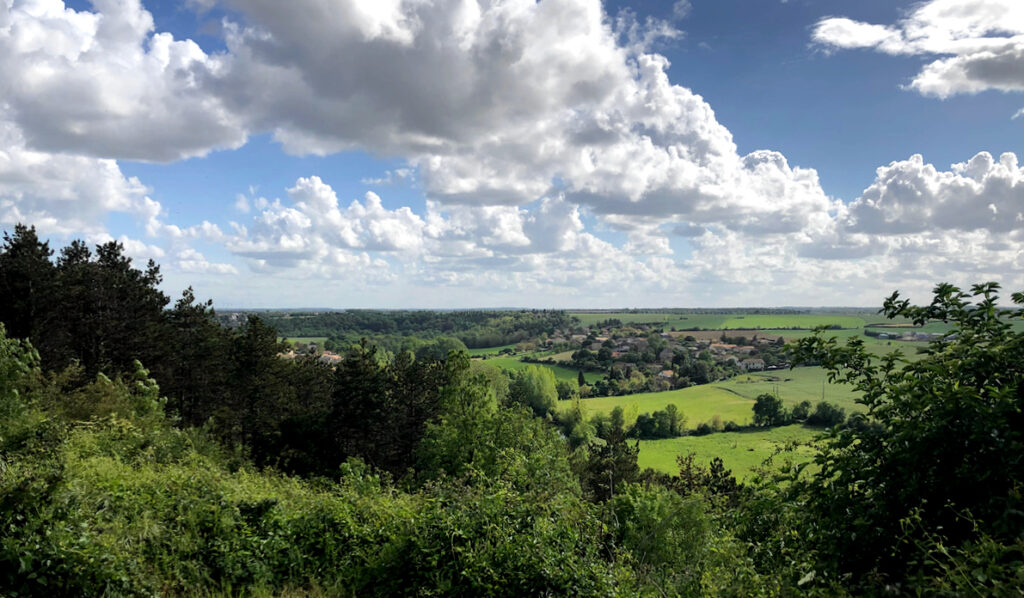 Poitou, where Mel and I both live You’d be wise to note the names of any local prominent people, or independent or famous shops or hotels, so that you don’t badmouth them by mistake or use their name for your villain or place of tragic criminal activity. Equally, buy some copies of the local newspaper and subscribe to one or two local online forums to find out what’s happening in that location and what people are concerned about. Oh, and read the property pages or go into an estate agent and take a copy of their listings or read their online offerings. The style, availability and cost of renting or buying may very well be a crucial point in your story for your characters.
But what if you decide to make it all up…?
Creating your own location means you have full creative control, but it also means that you have the responsibility to the reader to build that world in a credible and consistent way.
In one way, you’re released from the stress of researching every last detail of a real setting that people know, but it does mean that the made-up world must feel authentic even though if might be a space colony on Mars or 4th century Ancient Rome.
However, if writing a fictional world in the past, you will need to think how the landscape looked, what noise and smells dominate, how dangerous it is to walk along a street. Are there mountains, rivers, tracks, developed roads? What’s the weather like? Who rules and is there a legal/judiciary system? What’s growing in the fields? How are the street lights powered? How do people earn their money and what’s the level of technology and culture?
If you’re on Mars, you also need to think about how to move in different gravity and whether you’ll ever be able to keep the infernal red dust out of the food replicator. You’ll probably need to research science fiction tropes and works by some of the better writers in the field as there are definitely strong conventions for the genre. Woe betide you if you get it wrong!
 Mars – the Red Planet (NASA, public domain) However, although – unexpectedly – there may be a considerable amount of research, the freedom offered by a fictional world means you can bend it to fit in with your story. Sometimes, it can play a pivotal role in that story whatever its genre.
Some practical thoughts
- Visit real places whether you’re going to use that real place or clone it for an imaginary setting. I’ve been to many Roman ruins which show the outline of houses, baths and street patterns which inspire their 21st century Roma Nova versions. For Mel’s adventures, I know most of the places In Real Life, be they Orpington High Street, Poitou, an army barracks or the centre of Berlin.
- Do research why that setting is like it is. What is its history? Is it a market town, a dingy suburb, a beach resort? Has anything exciting or tragic happened there?
- And finally, think about combining the two, dipping into a real place but inventing fictional elements or, conversely, a fictional town with features that could be very familiar to the readers.
Happy writing!
Alison Morton is the author of Roma Nova thrillers – INCEPTIO, CARINA (novella), PERFIDITAS, SUCCESSIO, AURELIA, NEXUS (novella), INSURRECTIO and RETALIO, and ROMA NOVA EXTRA, a collection of short stories. Audiobooks are available for four of the series. Double Identity, a contemporary conspiracy, starts a new series of thrillers. JULIA PRIMA, Roma Nova story set in the late 4th century, starts the Foundation stories. The sequel, EXSILIUM, is now out.
Find out more about Roma Nova, its origins, stories and heroines and taste world the latest contemporary thriller Double Identity… Download ‘Welcome to Alison Morton’s Thriller Worlds’, a FREE eBook, as a thank you gift when you sign up to Alison’s monthly email update. As a result, you’ll be among the first to know about news and book progress before everybody else, and take part in giveaways.
If you enjoyed this post, do share it with your friends!Like this:Like Loading...
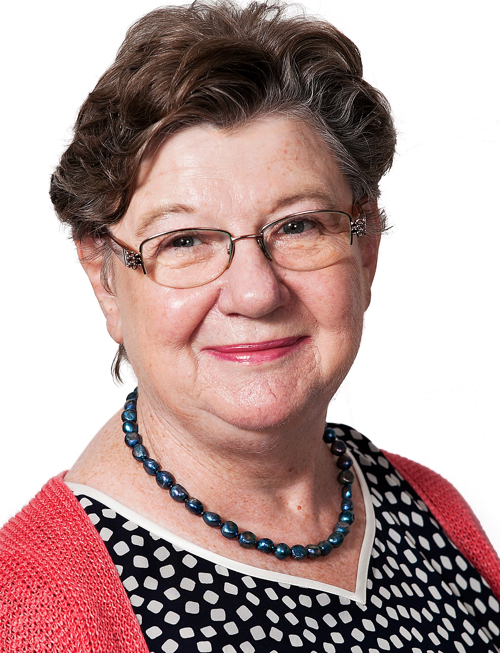 I am truly delighted to welcome writing friend Catherine Kullmann to my blog to celebrate the publication of her latest book, Lord Frederick’s Return. Catherine was born and educated in Dublin. Following a three-year courtship conducted mostly by letter, she married and moved to Germany where she lived for twenty-five years before returning to Ireland. She has worked in the Irish and New Zealand public services and in the private sector. Widowed, she has three adult sons and two grandchildren. I am truly delighted to welcome writing friend Catherine Kullmann to my blog to celebrate the publication of her latest book, Lord Frederick’s Return. Catherine was born and educated in Dublin. Following a three-year courtship conducted mostly by letter, she married and moved to Germany where she lived for twenty-five years before returning to Ireland. She has worked in the Irish and New Zealand public services and in the private sector. Widowed, she has three adult sons and two grandchildren.
She has always been interested in the extended Regency period, a time when the foundations of our modern world were laid. She loves writing and is particularly interested in what happens after the first happy end—how life goes on for the protagonists and sometimes catches up with them. Her books are set against a background of the offstage, Napoleonic wars and consider in particular the situation of women trapped in a patriarchal society.
She is the author of The Murmur of Masks, Perception & Illusion, A Suggestion of Scandal, The Duke’s Regret, The Potential for Love, A Comfortable Alliance, Lady Loring’s Dilemma and The Husband Criteria
She also blogs about historical facts and trivia related to this era. You can find out more about Catherine’s books and read the blog (My Scrap Album) at her website where you can also subscribe to her newsletter.
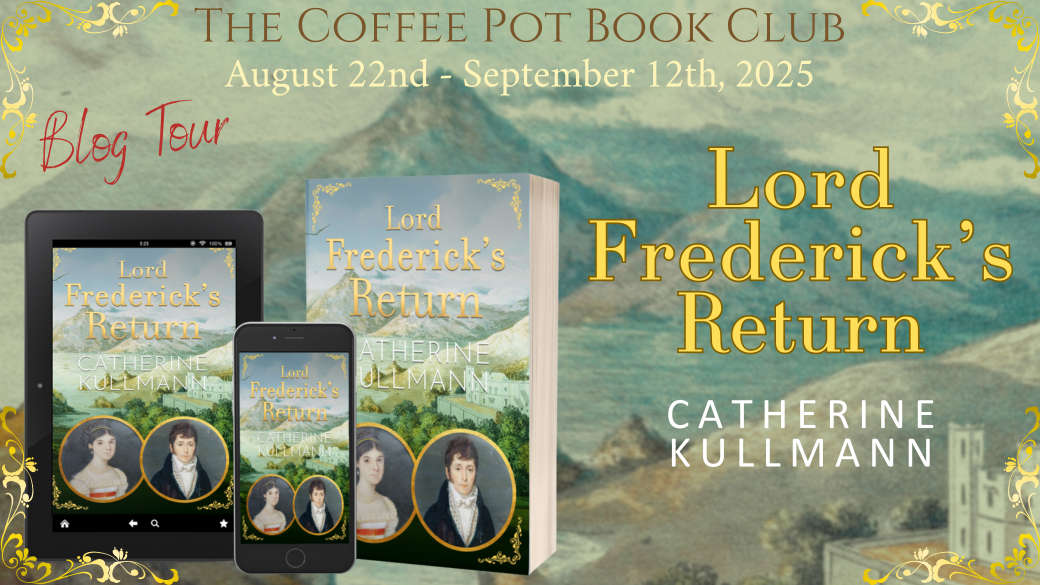
As part of her Coffee Pot Book Club tour, I asked Catherine to tell us about the fascinating high society world she has created and the cast of characters who inhabit them. I’m a true fan of her work, so I was intrigued to find out how and why she had dived into another of her side characters’ stories.
Over to Catherine!
I never set out to write a series, but my novels are all set in the same Regency world and I suppose it was inevitable that I did not create a separate pool of characters for each book but drew on the set of minor characters that already existed to find protagonists for a new story. Having said that, I have found myself caught by the question, ‘And what happened next?’ as well as being beset by readers with the same question. And, of course, I fell into the traps.
The Murmur of Masks was the third book I wrote but the first book I published. It followed on from Perception & Illusion. In a pivotal scene at a masquerade in P&I, a group of ladies have attended disguised as the Nine Muses. As midnight approaches, Thalia approaches Clio who is dancing, unrecognised, with her husband:
“The carriage is outside if you still wish to leave early,” Thalia whispered.
“I do, and you?”
“I think I’ll stay awhile.”
I just had to know what happened when Thalia went back to the ball and so came The Murmur of Masks.
When you want to write a spin-off or side character’s story, the first thing you must do is go back to the book or books they featured in and write down absolutely everything you already know about them. If you don’t do this, you will get yourself in a dreadful tangle later, not only about obvious things like age or appearance but also about the more subtle hints in the earlier books that, overlooked, can cause clashing inconsistencies for your most valuable readers, the ones who love your stories.
(I completely concur with this – I had similar ‘challenges’ when writing the novellas in the Roma Nova series! – Alison)
In P&I, the Nine Muses were a group of women known as ‘Flora’s Fillies, protégées of the Duchess of Gracechurch, who “tends to befriend young wives whose husbands are, well, distant, shall we say. They’re safe in that circle, well as safe as they wish to be. The older women keep an eye out for the younger ones, warn them of the worst rakes, keep them out of harm’s way.”
So I knew that Thalia was a member of this group and had to develop a back story for her that was consistent with the events in P&I. Because of this back story, I published The Murmur of Masks first, because it started a decade earlier than P&I. Once I had set the parameters, writing it was no different than writing any other book in that at some stage the characters take control of the narrative. The one thing that had to happen was a scene at the masquerade with the same small interchange. Once again, it is a pivotal scene that determines the outcome of the book.
As soon as A Suggestion of Scandal was published, readers were asking for a sequel. In particular, they wanted to know what happened to Chloe Loring, whose governess, Rosa Fancourt is the heroine of ASoS. I had two problems here. Firstly, Chloe was still too young—in modern terms, she had just graduated from high school. I wanted her to grow up before deciding her final path.
I was also very interested in Chloe’s mother, Delia, a villain in ASoS and who, while still married, ends up eloping to the continent with another man. Was this the full story? I was tied by the very tight timeframe and events of ASoS but was able successfully to flip the perspective, and reviewers were very understanding of Delia’s situation, commenting very positively on her portrayal. Lady Loring’s Dilemma is told partly from Delia’s point of view and partly from Chloe’s.
Chloe herself is one of the triumvirate of heroines in the next book, The Husband Criteria but her story has not yet reached its end. All going well, that will be my upcoming book.
It is amazing how your favourite characters become part of your family. Even though you may not be writing about them, you know where they are in life. You never know when one will pop back in with a riveting proposition. A quick recap of their circumstances, and you can set sail with them again.
(So very true, Catherine! I look forward to the next voyage. – Alison)
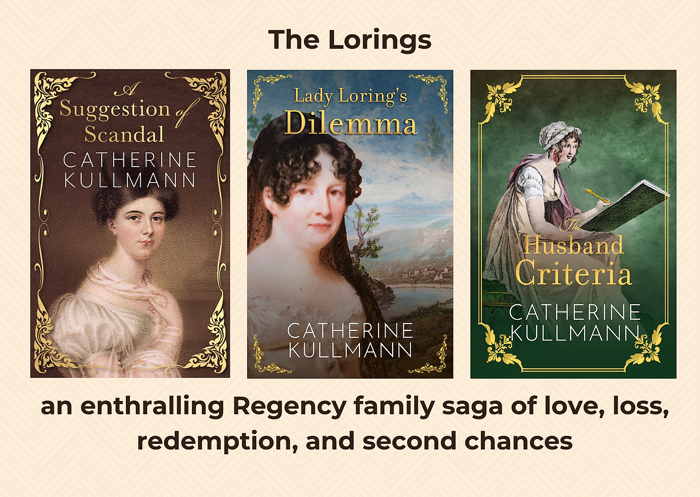
––––––
Connect with Catherine
Website: http://www.catherinekullmann.com/
Twitter / X: https://twitter.com/CKullmannAuthor
Facebook: https://www.facebook.com/catherinekullmannauthor
Book Bub: https://www.bookbub.com/profile/catherine-kullmann
Amazon Author Page: viewauthor.at/ckullmannamazonpage
Goodreads: https://www.goodreads.com/author/show/15549457.Catherine_Kullmann
––––––
What’s Lord Frederick’s Return about?
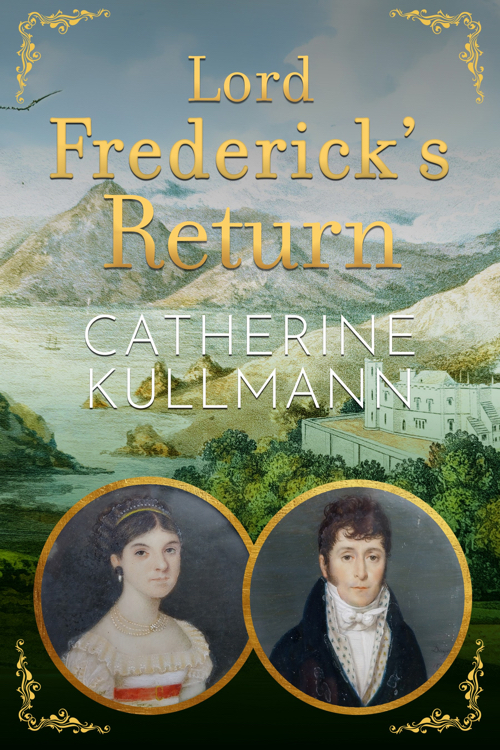 An older hero, an enigmatic heroine and a delightfully outspoken four-year-old. Throw scandal into the mix for a gripping and tender Regency love story An older hero, an enigmatic heroine and a delightfully outspoken four-year-old. Throw scandal into the mix for a gripping and tender Regency love story
August 1816. Lord Frederick Danlow returns to England after spending 18 years in India. He plans to make a home for himself and his motherless, four-year-old daughter, Ruperta. Unsure where to start, he accepts an invitation to stay at Ponsonby Place, home of Colonel Jack Ponsonby who made his fortune in India, and his daughter Susannah, the mistress of the household.
Soon Frederick finds himself in need of a governess—and a wife? The more time he spends with Susannah, the more his admiration of her deepens. Is she the woman with whom he will share his life?
He is resolved to court her, but then his younger brother Henry engulfs his family in an appalling scandal that could prevent any lady from agreeing to a connection with it. Now Frederick must support his family during this ordeal.
But what of Susannah? What will she say when she hears of the scandal? Should he, dare he offer her his heart and his hand?
Buy Lord Frederick’s Return here: https://mybook.to/Frederick
My thoughts
When I see a new Catherine Kullmann novel is out, I immediately buy it immediately. She writes fluently and vividly so you can settle back easily to enjoy the story. Her research is impeccable; you are immersed in early 19th century life from the first page.
Some of the values and attitudes seem quite odd to us now. The social and sexual mores for young white men in British India seem harsh on local women and the children of such unions. However, Ms Kullman treads carefully but authentically through these, particularly in relation to race, colonial life and illegitimacy.
We are led into many aspects of life in these times, not only the graceful life in a country gentleman’s residence but the uncompromising court system at the Old Bailey, the discomfort and boredom of long distance travel as well as the equal discomfort of living in a draughty medieval castle in the north.
The romance is delicately developed, sensitive without ever falling into sentimentality. Both parties are perfectly aware of their social and material environment and the author navigates this step by careful step. Highly recommended!
Alison Morton is the author of Roma Nova thrillers – INCEPTIO, CARINA (novella), PERFIDITAS, SUCCESSIO, AURELIA, NEXUS (novella), INSURRECTIO and RETALIO, and ROMA NOVA EXTRA, a collection of short stories. Audiobooks are available for four of the series. Double Identity, a contemporary conspiracy, starts a new series of thrillers. JULIA PRIMA, Roma Nova story set in the late 4th century, starts the Foundation stories. The sequel, EXSILIUM, is now out.
Find out more about Roma Nova, its origins, stories and heroines and taste world the latest contemporary thriller Double Identity… Download ‘Welcome to Alison Morton’s Thriller Worlds’, a FREE eBook, as a thank you gift when you sign up to Alison’s monthly email update. As a result, you’ll be among the first to know about news and book progress before everybody else, and take part in giveaways.
If you enjoyed this post, do share it with your friends!Like this:Like Loading...
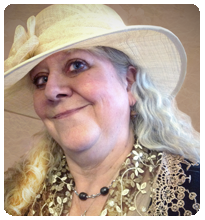 Today, I am delighted to welcome Helen Hollick back on my blog, this time to spotlight her latest release, A Mischief of Murder, the sixth in her cosy mystery series featuring Jan Christopher. Tea, flowers, scones, Devon cream, village intrigue – and a touch of murder. Today, I am delighted to welcome Helen Hollick back on my blog, this time to spotlight her latest release, A Mischief of Murder, the sixth in her cosy mystery series featuring Jan Christopher. Tea, flowers, scones, Devon cream, village intrigue – and a touch of murder.
Known for her captivating storytelling and rich attention to historical detail, Helen’s historical fiction, nautical adventure series, cosy mysteries – and her short stories – skilfully invite readers to step into worlds where the boundaries between fact and fiction blend together.
Helen started writing as a teenager, but after discovering a passion for history, was initially published in 1993 in the UK with her Arthurian Pendragon’s Banner Trilogy and two Anglo-Saxon novels about the events that led to the 1066 Battle of Hastings, one of which, The Forever Queen (USA title – A Hollow Crown in the UK) became a USA Today best-seller. Her Sea Witch Voyages are nautical-based adventures inspired by the Golden Age of Piracy. She also writes the Jan Christopher cosy mystery series set during the 1970s, and based around her, sometimes hilarious, years of working as a North London library assistant. Her 2025 release is Ghost Encounters, a book about the ghosts of North Devon – even if you don’t believe in ghosts you might enjoy the snippets of interesting history and the many location photograhs..
Helen and her family moved from London to Devon after a Lottery win on the opening night of the London Olympics, 2012. She spends her time glowering at the overgrown garden, fending off the geese, chasing the peacocks away from her roses, helping with the horses and wishing the friendly, resident ghosts would occasionally help with the housework…
What’s A Mischief of Murder about ?
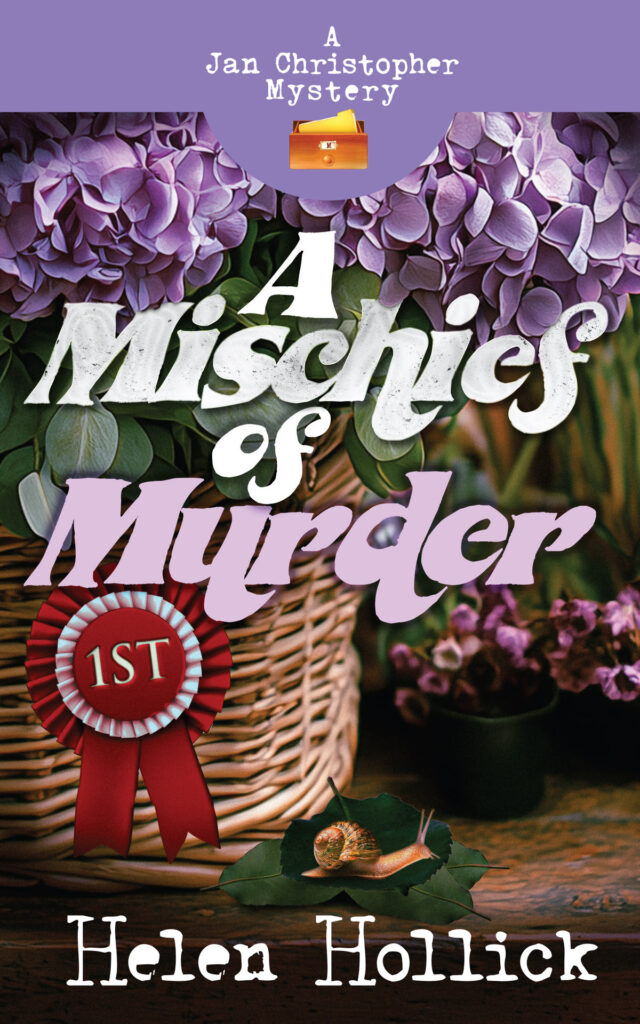
The village flower and veg show should be a fun annual event – but who added mischief and murder to the traditional schedule?
July 1973
Old friends and new enemies? Jan Christopher’s Aunt Madge is to be a judge at Chappletawton’s annual village flower and vegetable summer show – a chance for the family to have a holiday in the Devon countryside, especially as Jan’s fiancé, DS Laurie Walker, is still recovering from gunshot wounds and her uncle, DCI Toby Christopher, is enduring injury-related sick leave.
The event should be a fun occasion where friendly rivalry between gardeners, cooks and crafters lead to the hopeful winning of the coveted Best In Show trophy – but who added mischief and murder to the traditional schedule?
Praise for the Jan Christopher Mysteries:
“A delight—Miss Read meets The Darling Buds of May, with a dash of St. Mary Mead. Helen Hollick’s signature voice shines throughout, full of warmth and wit. The characters keep growing in such satisfying ways, making every visit feel like coming home.” – Elizabeth St.John
“The Darling Buds of May …but in Devon instead of Kent.” – Alison Morton
“I sank into this gentle cosy mystery story with the same enthusiasm and relish as I approach a hot bubble bath, and really enjoyed getting to know the central character, a shy young librarian, and the young police officer who becomes her romantic interest. The nostalgic setting of the 1970s was balm, so clearly evoked, and although there is a murder at the heart of the story, it was an enjoyable comfort read.” – Debbie Young, author of the Sophie Sayers cosy mysteries
“I really identified with Jan – the love of stories from an early age, and the careers advice – the same reaction I got – no one thought being a writer was something a working-class girl did! The character descriptions are wonderfully done.” Amazon Reader
“Brilliant! I’m so enjoying Helen’s well-researched murder mystery. I’m not giving anything away here, except to say there’s lots of nostalgia, and detail that readers of a certain age will lap up. A jolly good read. In my opinion, it would make a great television series.” Amazon Reader
Buy A Mischief of Murder here: Amazon Universal: https://mybook.to/MischiefOfMurder
Available as: e-book, Kindle Unlimited and paperback
My thoughts
Ms Hollick has established her characters Jan and Laurie very well in the five preceding stories. In this sixth book, Laurie is recovering from injuries sustained in the line of duty and is staying with his parents in Devon. Jan, her uncle Toby (Laurie’s boss – DCI Christopher) and her aunt Madge soon join them in the Devon village of Chappeltawton.
Chappeltawton is preparing for the annual fruit and veg show. If you know anything about English village life, the competition in such shows is fierce with no quarter given. Some competitors take it very, very seriously… Aunt Madge has agreed to be one of the judges. So, rather unfortunately, has Rose, an entitled and ‘precious’ television presenter. Fireworks guaranteed, along with a body…
Ms Hollick introduces a large cast of supporting characters, some familiar, others new, but draws them so deftly that we never become confused. Her other strength is the sheer period detail which she weaves in almost without us being aware of it but giving ua a vivid image nevertheless.
A Mischief of Murder ambles along as Jan and Laurie set about investigating the mystery while dealing with the lethal nature of the village produce show. The definite identity of the murderer is still up in the air, but as in much of village life, sometimes these things remain a mystery. The identity of the cucumber and onion saboteur is often more important!
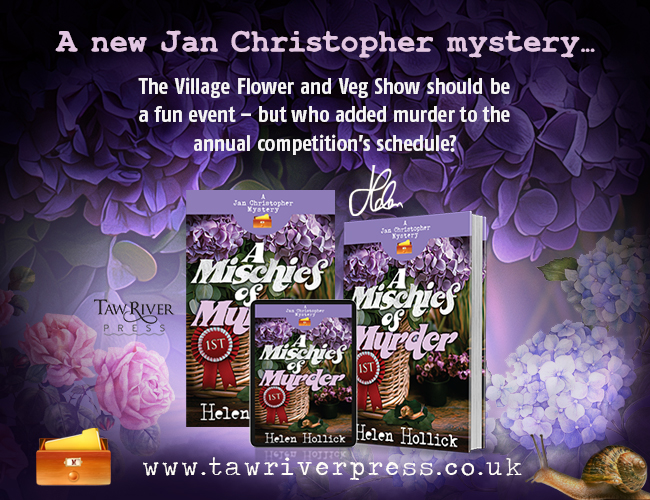
—————-
Connect with Helen
Website: https://helenhollick.net/
Amazon Author Page: https://viewauthor.at/HelenHollick
Facebook: https://www.facebook.com/helen.hollick
Blog: supporting authors & their books https://ofhistoryandkings.blogspot.com/
Bluesky: @helenhollick.bsky.social
Monthly ‘newsletter’ blog Thoughts from a Devonshire Farmhouse
https://thoughtsfromadevonshirefarmhouse.blogspot.com/
—————
Alison Morton is the author of Roma Nova thrillers – INCEPTIO, CARINA (novella), PERFIDITAS, SUCCESSIO, AURELIA, NEXUS (novella), INSURRECTIO and RETALIO, and ROMA NOVA EXTRA, a collection of short stories. Audiobooks are available for four of the series. Double Identity, a contemporary conspiracy, starts a new series of thrillers. JULIA PRIMA, Roma Nova story set in the late 4th century, starts the Foundation stories. The sequel, EXSILIUM, is now out.
Find out more about Roma Nova, its origins, stories and heroines and taste world the latest contemporary thriller Double Identity… Download ‘Welcome to Alison Morton’s Thriller Worlds’, a FREE eBook, as a thank you gift when you sign up to Alison’s monthly email update. As a result, you’ll be among the first to know about news and book progress before everybody else, and take part in giveaways.
If you enjoyed this post, do share it with your friends!Like this:Like Loading...
 I’m delighted to welcome Julia Ibbotson to the blog to highlight her excellent time-slip novel A Shape on the Air. (Here in Roma Nova, time twisting is always attractive.) I’m delighted to welcome Julia Ibbotson to the blog to highlight her excellent time-slip novel A Shape on the Air. (Here in Roma Nova, time twisting is always attractive.)
Fascinated by the medieval world and the concept of time, Julia has written historical mysteries with a frisson of romance. Her books are evocative of time and place, well-researched and uplifting page-turners. Her current series focuses on early medieval time-slip/dual-time mysteries.
Julia read English at Keele University, England, specialising in medieval language, literature and history, and has a PhD in socio-linguistics. After a turbulent time in Ghana, West Africa, she became a school teacher, then a university academic and researcher. Her break as an author came soon after she joined the RNA’s New Writers’ Scheme in 2015, with a three-book deal from Lume Books for a trilogy (Drumbeats) set in Ghana in the 1960s.
She went on to publish five other books, including A Shape on the Air, an Anglo-Saxon timeslip mystery, and its two sequels The Dragon Tree and The Rune Stone. Her latest novel is the first of a new series of Anglo-Saxon dual-time mysteries, Daughter of Mercia, where echoes of the past resonate across the centuries.
Her books will appeal to fans of Barbara Erskine, Pamela Hartshorne, Susanna Kearsley, and Christina Courtenay. Her readers say: ‘Julia’s books captured my imagination’, ‘beautiful story-telling’, ‘evocative and well-paced storylines’, ‘brilliant and fascinating’ and ‘I just couldn’t put it down’.
I’ve read A Shape on the Air, the first in the Dr DuLac series and can confirm all this is true!
Today, Julia is taking A Shape on the Air on an intensive one-day blog tour, visiting many excellent blogs.

Happy touring, Julia!
————–
What’s A Shape in the Air about?
 Can echoes of the past threaten the present? They are 1,500 years apart, but can they reach out to each other across the centuries? One woman faces a traumatic truth in the present day. The other is forced to marry the man she hates as the ‘Dark Ages’ unfold. Can echoes of the past threaten the present? They are 1,500 years apart, but can they reach out to each other across the centuries? One woman faces a traumatic truth in the present day. The other is forced to marry the man she hates as the ‘Dark Ages’ unfold.
How can Dr Viv DuLac, medievalist and academic, unlock the secrets of the past?
Traumatised by betrayal, she slips into 499 AD and into the body of Lady Vivianne, who is also battling treachery. Viv must uncover the mystery of the key that she unwittingly brings back with her to the present day, as echoes of the past resonate through time.
But little does Viv realise just how much both their lives across the centuries will become so intertwined. And in the end, how can they help each other across the ages without changing the course of history?
Buy the book here: https://myBook.to/ASOTA
Or read on KindleUnlimited (subscription required.)
————–
Connect with Julia
Website: https://juliaibbotsonauthor.com
Twitter/X: https://twitter.com/@juliaibbotson
Facebook: https://www.facebook.com/JuliaIbbotsonauthor
Instagram: https://www.instagram.com/julia.ibbotson
Bluesky: https://bsky.app/profile/juliaibbotson.bsky.social
Pinterest: https://www.pinterest.co.uk/juliai1
Amazon Author Page: https://Author.to/JuliaIbbotsonauthor
Goodreads: https://goodreads.com/juliaibbotson
————–
Alison Morton is the author of Roma Nova thrillers – INCEPTIO, CARINA (novella), PERFIDITAS, SUCCESSIO, AURELIA, NEXUS (novella), INSURRECTIO and RETALIO, and ROMA NOVA EXTRA, a collection of short stories. Audiobooks are available for four of the series. Double Identity, a contemporary conspiracy, starts a new series of thrillers. JULIA PRIMA, Roma Nova story set in the late 4th century, starts the Foundation stories. The sequel, EXSILIUM, is now out.
Find out more about Roma Nova, its origins, stories and heroines and taste world the latest contemporary thriller Double Identity… Download ‘Welcome to Alison Morton’s Thriller Worlds’, a FREE eBook, as a thank you gift when you sign up to Alison’s monthly email update. As a result, you’ll be among the first to know about news and book progress before everybody else, and take part in giveaways.
If you enjoyed this post, do share it with your friends!Like this:Like Loading...
 Updated and republished Updated and republished
Hooray! Summer is here; warm, lazy days, extra wine, days out with the family and friends, a holiday away. Mmm.
We have two scenarios before us:
The first:
You have a deadline looming, your fans are waiting, your muse is bashing away in your head with fantastic scenes you simply must write. And then you’re speaking or attending conferences and festivals. No time to have time off. Guilt sets in…
The second:
Mentally and emotionally, you’ve ground to a halt with your writing. Perhaps like me you had a book out in the spring (Double Stakes) and/or a short story in a collection (Fate: Tales of History, Mystery and Magic) maybe it’s your body and Stone Age brain instinctively reacting to the longer days, the warmer air, the luxurious leaves and colourful blooms in the garden. The urge to get outside is almost overwhelming. But shouldn’t you be writing? Again, guilt sets in…
But let’s introduce some balance here…
1. Nobody can work 365 days of the year. Well, they can, but what a dull person they’d be, and probably an early inhabitant of the graveyard.
2. Set realistic goals. Halve your usual target and prepare for that goal to be disrupted as friends and family visit, children return from university, or neighbours invite you to barbecues or lunchevery few days.
3. Sales dwindle in the summer, so don’t stress about the sales figures. (Actually, stressing sales figures at any time is not good for you.)
4. View your holidays as research trips if your conscience is bothering you. Not just Roman walls, medieval castles or mosaics, but an opportunity to watch people out of their normal environment or see other environments altogether. And swimming in the (hopefully) warm, salty sea gets you in touch with your tactile side.
5. Snatch time when doing other things to do small writing tasks like looking things up, sending an email to a blogger, drafting a dialogue. Amazing how you can think through a scene while mixing a salad or watering the plants!
6. Work on a little project. I’ve just put together ‘The 500 Word Writing Buddy‘. It was a compilation of articles from the past few years of my writing and publishing column in The Deux-Sèvres Monthly. I worked on it intermittently over the one summer then printed out some paper copies for selling at local fairs and fetes and sold out at a fair that Christmas. It’s now updated – another summer project a few years later – and also available widely as an ebook.
So, relax a little while the sun is shining and read a good book or two…
————-
P.S. If it’s really hot where you are, you may find this post helpful about keeping your house/hotel room cool.
Alison Morton is the author of Roma Nova thrillers – INCEPTIO, CARINA (novella), PERFIDITAS, SUCCESSIO, AURELIA, NEXUS (novella), INSURRECTIO and RETALIO, and ROMA NOVA EXTRA, a collection of short stories. Audiobooks are available for four of the series. Double Identity, a contemporary conspiracy, starts a new series of thrillers. JULIA PRIMA, Roma Nova story set in the late 4th century, starts the Foundation stories. The sequel, EXSILIUM, is now out.
Find out more about Roma Nova, its origins, stories and heroines and taste world the latest contemporary thriller Double Identity… Download ‘Welcome to Alison Morton’s Thriller Worlds’, a FREE eBook, as a thank you gift when you sign up to Alison’s monthly email update. As a result, you’ll be among the first to know about news and book progress before everybody else, and take part in giveaways.
If you enjoyed this post, do share it with your friends!Like this:Like Loading...
|
Subscribe to Blog via Email
Join 368 other subscribers.
Categories
Archive
|

























